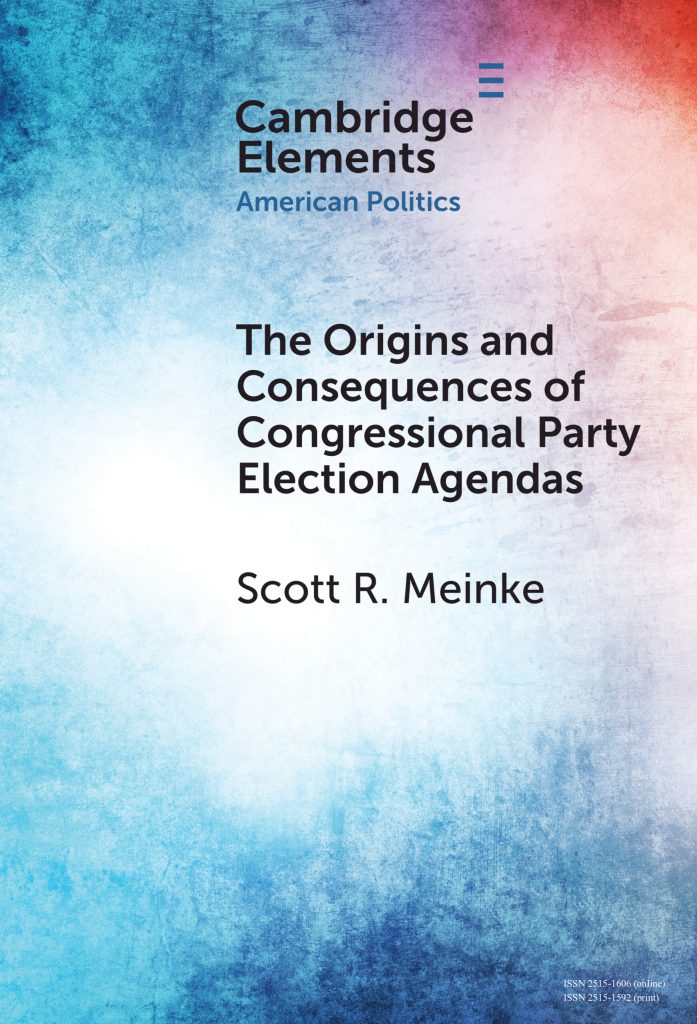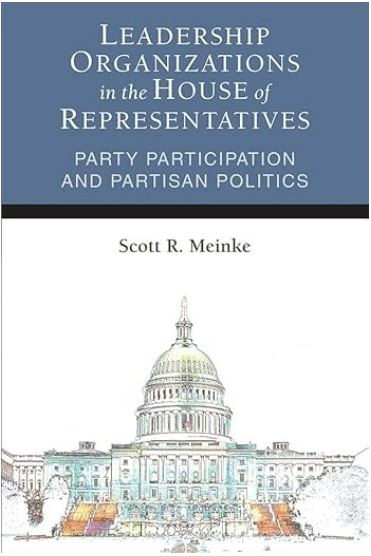Books
The Origins and Consequences of Congressional Party Election Agendas (2023, Cambridge University Press, Elements in American Politics series)

This research examines congressional party election agendas, asking first how they originate and what priorities within the party they strategically represent and, second, how they shape post-election legislative activity and policymaking. After surveying post-1980 agenda efforts, I focus on two prominent cases, the Republican Contract with America (1994) and the Democratic New Direction for America (2006). Using archived records and other qualitative evidence, I show that both agendas were leadership-driven but were developed in lengthy and relatively inclusive processes. Quantifying agenda content, I demonstrate that the parties strategically skewed agenda promises toward select segments of the caucus, as measured in bill introduction priorities, and the promises echoed leadership messaging from speeches and floor motions in the Congress before the election. After winning a majority, both parties shifted the House’s legislative activity sharply toward agenda priorities, but the impact on policy outcomes was substantially constrained.
Leadership Organizations in the House of Representatives: Party Participation and Partisan Politics (University of Michigan Press 2016, paperback 2019) [JSTOR]

Through structures such as whip organizations and steering committees, Republicans and Democrats have created a participatory framework for party government over the last forty years. Based on extensive archival research and quantitative analysis, I demonstrate the importance of member participation for both the leadership and the rank-and-file. Party members involved in leadership organizations benefit concretely in their career, constituency, and policy ambitions. As the top leadership pursues collective electoral and policy objectives, the participatory framework facilitates their coordination, communication, and persuasion tasks. In addition to outlining the importance of participation to the life of congressional parties, the book shows that strengthening party government conditions have narrowed the scope of participation and increased the leadership’s control over these organizations.
- Buy the book at Amazon or the University of Michigan Press.
- New Books Network podcast interview.
- Book review in Perspectives on Politics
- Book review in Congress and the Presidency.
- Book review in Journal of Politics.
- Book review in Party Politics.
- Washington Post Monkey Cage article on the 115th Congress.
- LegBranch blog post on party capacity and party organizations.
- Data on party organization membership used in the book.
Articles and Book Chapter
Scott R. Meinke. Forthcoming. “Messaging Both Sides: Party Leadership Support for Conflicting Positions in the US House” Party Politics. [Data and replication files]
Scott R. Meinke. 2025. “Media Coverage of the Senate Filibuster and Its Effect on Public Opinion.” Political Research Quarterly 78:341-357. [Data and replication files]
Scott R. Meinke. 2024. How Congressional Leaders Define Loyalty: Validating US House Party Voting Scores with Party Leadership Records. Journal of Legislative Studies 30:115-127. [Data and replication files]
Scott R. Meinke. 2022. “The Rise of Multiple-Measures Rules in the House of Representatives.” Congress and the Presidency 49:31-59. [Replication Files] (Related post on LegBranch.org)
Scott R. Meinke. 2019. “Rising to Leadership in an Era of Political Change: Bob Michel and the 1970s House Minority Party.” In Robert H. Michel: Leading the Republican House Minority, Frank H. Mackaman and Sean Q Kelly, eds. University of Kansas Press. [JSTOR]
Scott R. Meinke. 2019. “The Resilience of Electoral Responsiveness in a Polarized Congress.” Journal of Politics 81:e17-e22. (Review essay)
Alexis Leanna Henshaw and Scott R. Meinke. 2018. “Data Analysis and Data Visualization as Active Learning in Political Science.” Journal of Political Science Education 14:423-439.
Scott R. Meinke. 2018. “Distributive Politics and Party Participation in the U.S. House.” American Politics Research 46:671-694. [Replication Files]
Scott R. Meinke. 2014. “The Changing Roles of House Party Leadership Organizations: The House Republican Policy Committee.” Congress and the Presidency 41:190-222.
Edward B. Hasecke, Scott R. Meinke, and Kevin M. Scott. 2013. “Congressional Endorsements in the Presidential Nomination Process: Democratic Superdelegates in the 2008 Election.” American Politics Research 41:99-121. (Related post on The Washington Post’s Monkey Cage blog, 1 March 2016)
Scott R. Meinke. 2012. “Party Size and Representation: Evidence from the Nineteenth Century House of Representatives.” Legislative Studies Quarterly 37:175-197. [JSTOR]
Scott R. Meinke. 2009. “Presentation of Partisanship: Constituency Connections and Partisan Congressional Activity.” Social Science Quarterly 90:854-867. [JSTOR]
Scott R. Meinke. 2008. “Institutional Change and the Electoral Connection in the Senate: Revisiting the Effects of Direct Election.” Political Research Quarterly 61:445-457. [JSTOR] [Replication Files]
Scott R. Meinke. 2008. “Who Whips? Party Government and the Expansion of the House Whip Systems.” American Politics Research 36:639-668.
Scott R. Meinke. 2007. “Slavery, Partisanship, and Procedure in the US House: The Gag Rule, 1836-1845.” Legislative Studies Quarterly 32:33-57. [JSTOR] [Online Appendix] [Replication Files]
Scott R. Meinke and Kevin M. Scott. 2007. “Collegial Influence and Judicial Voting Change: The Effect of Membership Change on US Supreme Court Justices.” Law and Society Review 41:909-938. [JSTOR]
Scott R. Meinke, Jeffrey K. Staton, and Steven T. Wuhs. 2006. “State Delegate Selection Rules for Presidential Nominations, 1972-2000.” Journal of Politics 68:180-193. [JSTOR] [Online Appendix] [Replication Files]
Scott R. Meinke. 2005. “Long-term Change and Stability in House Voting Decisions: The Case of the Minimum Wage.” Legislative Studies Quarterly 30:103-126. [JSTOR] [Replication Files & Corrected Table 1]
Janet M. Box-Steffensmeier, David Kimball, Scott R. Meinke, and Katherine Tate. 2003. “The Effects of Political Representation on the Electoral Advantages of House Incumbents.” Political Research Quarterly 56:259-270. [JSTOR]
Scott R. Meinke and Edward B. Hasecke. 2003. “Term Limits, Professionalization, and Partisan Control of US State Legislatures.” Journal of Politics 65:898-908. [JSTOR] [Replication Files]
Scott R. Meinke and William D. Anderson. 2001. “Influencing from Impaired Administrations: Presidents, White House Scandal, and Legislative Leadership.” Legislative Studies Quarterly 26: 639-659. [JSTOR] [Online Appendix]